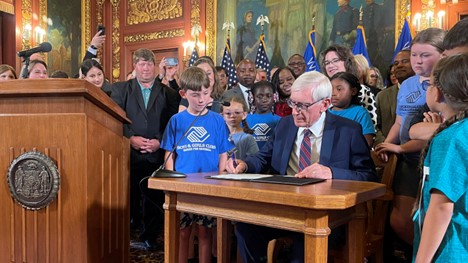
Governor Tony Evers signed the 2023-2025 biennial state budget in early July. This concluded a full year of drafting and legislative action on the massive document, during which the Council and our allies made a lot of calls, paid numerous visits and sent many emails to the policymakers who created the bill. Our efforts were not entirely successful, but there were still many benefits to the year’s worth of work we put into our budget advocacy.
“We didn’t get the dollar amounts we requested for our population’s needs, but we’re building momentum on our issues,” says Executive Director Denise Jess. The latter point cannot be overemphasized. The Council takes a “long haul” approach to state funding. The momentum Denise mentions is the result of constant engagement and follow-up with state agencies and legislators. The results could be clearly seen in the form of many legislators experiencing “aha moments” in connecting the needs of people with disabilities with the intricacies of state funding and public policy.
This doesn’t happen magically or quickly. It takes tireless advocacy work every biennium.
“We meet with state agencies a year in advance of the next state budget,” says Denise. “Trying to promote what’s important to us, what our populations’ needs are.” Before the Governor releases his version of the budget in the December before a budget year, Denise meets with staff in the Governor’s Office. “We generally highlight three primary, high-level priorities,” she says.
“After the Governor’s budget is released, we communicate through our advocacy action alerts and working in tandem with other organizations with similar missions,” Denise says. “The focus at that point is the Joint Finance Committee.” This part of the process requires engaging legislators on and off the committee. Denise says that these days, she’s encountering more and more lawmakers who have a family member with a disability. This makes a difference.
“When we were meeting with several legislators on the Assembly and Senate Transportation Committees, some shared that they have family members who are nondrivers because of either age or disability,” Denise says.
“One legislator cried,” recalls Denise. “Another talked about her grandma and how small her world has become without a driver’s license.” Another asked Denise and other advocacy partners to come back to talk about the caregiver crisis because that legislator was coping with a relative in a long-term care facility.
These are momentum-building moments. The kind of conversations that are remembered the next budget cycle—or sooner, such as when the Council strategically picks an item that did not make it into the final budget and pitches it to lawmakers as a stand-alone bill for the coming legislative session.
An example of this is “Steve’s Law,” a proposal the Governor included in his proposed budget but which was subsequently removed by the Joint Finance Committee. In a nutshell, the bill would equalize access to hunting and fishing licenses by allowing a State ID rather than only a driver’s license as required identification to register through the Department of Natural Resources’ Go Wild system.
It’s all about educating legislators that these are real issues impacting real people. “It didn’t result in as many things that we wanted to pass in the budget,” says Denise, “but it’s paving the path for gains in the long run.” Denise says this attitude is a must-have in the advocacy business. “If you focus on what you don’t get instead of on the ongoing process, you might throw up your hands and say ‘Why are we doing this?’” Because the Council is in it for the long haul, we know exactly why.

